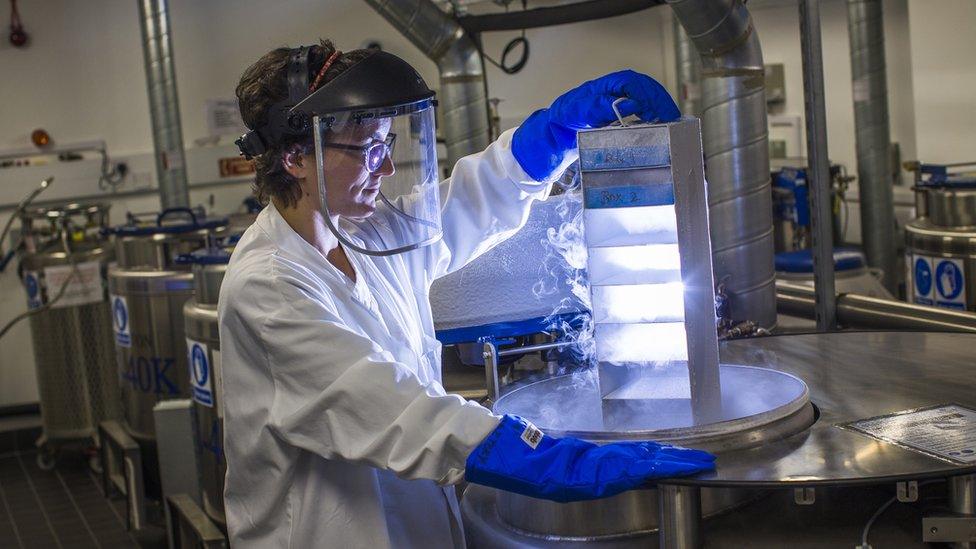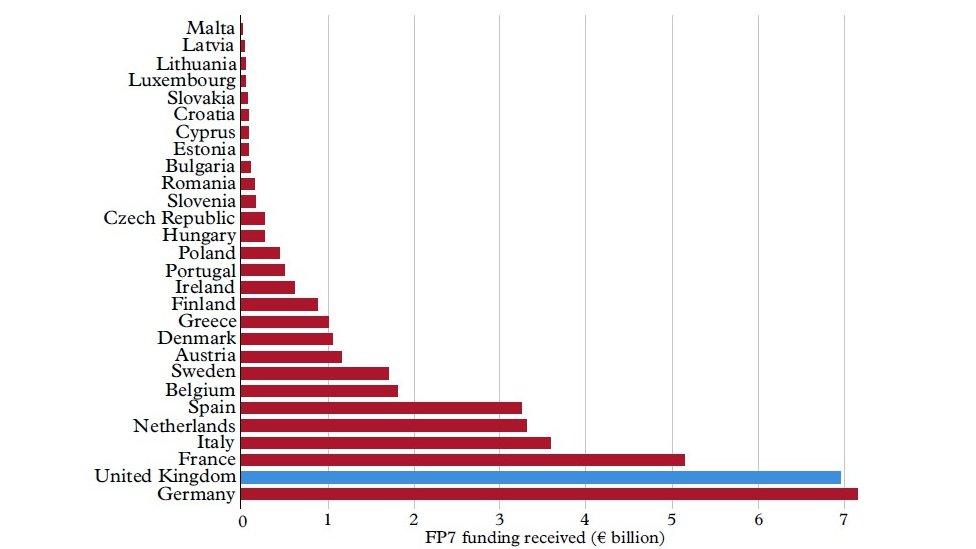Concern over Brexit's impact on science
- Published

Would leaving the EU affect the UK's influence at the top tables in science?
The UK science community draws vital benefits from EU membership and could lose influence in the event of an exit, says a House of Lords report, external.
But scientists in favour of leaving say the UK would still be eligible for EU funding along with other benefits if it became an associate member.
"Restrictive" regulations could block cutting-edge research, the peers said.
UK researchers placed a high value on collaboration opportunities afforded by EU membership, they added.
A number also believe the UK would lose its ability to influence EU science policy in the event of leaving - something that's disputed by pro-Brexit campaigners.
"Nearly a fifth... 18.3% is the exact figure, of EU funds returning to this country go towards funding research and development," said Lord Selborne, external, chairman of the Lords Science and Technology Committee, external, adding that the UK did extremely well from the arrangement.
The Conservative peer, who supports a group campaigning to remain in, explained: "The overwhelming evidence from the scientific community was that they greatly valued EU membership, and they particularly drew attention to their success in attracting 'framework programme' funds."
But the peers found this was only true for UK universities; businesses, meanwhile, performed poorly in EU competitions for research funding.
They also heard evidence that some EU regulatory frameworks - particularly those governing clinical trials, the welfare of lab animals and data protection - had been a barrier to research carried in the UK.

Total funds awarded through the EU's Framework Programme 7
A spokesperson for Scientists for Britain, external, which campaigns for the UK to leave, told BBC News: "The report refused to come down one way or another on remain or leave. We thought that was positive... just leaving would make no difference at all to our science relationship with the EU."
But Dr Mike Galsworthy, programme director for Scientists for EU, external, which campaigns for the UK to remain, said: "This inquiry has been running since 2015, collecting over 70 written submissions and dozens of oral testimonies. It's been a huge 'warts and all' analysis of our current working relationship with the EU on science. As the final report says, the overwhelming balance of opinion is for remaining in."
If it left, the UK could reinvest an amount equivalent to EU science funds into the national budget. But Lord Selborne said there would be other claims on the public purse, and one would need to be "extremely trusting" to expect the Treasury to match EU financing.
Alternatively, the UK could become an "associated country", of which there are currently 14 - including Norway, Iceland and Switzerland. These nations are not EU members but still participate in EU framework programme funding schemes.
The spokesman for Scientists for Britain commented: "It's fallacious and beyond the realms of possibility that we would leave the existing collaborations network."
He said the EU affirms that associates have equal status with members and the Lords report contained no evidence that the UK would lose influence on science policy if it left.
Bilateral talks that are held between associate countries and the EU could even give them more bargaining power, the spokesman explained.
But Lord Selborne commented: "In the short term, there's a wide perception that the implications [of an EU exit] would be negative.
"The ability of associate members such as Switzerland and Norway to influence regulation, or the research agenda at the European level, is certainly diminished."

Participation in projects such as the Large Hadron Collider are not dependent on EU membership
The report says the ease with which talented researchers can move between the UK and the rest of the EU is of enormous benefit. It said every effort should be made to preserve this.
The Scientists for Britain campaign said freedom of movement made it easy for academic departments to recruit from the EU, but visa restrictions on migrants from non-EU countries made it much more difficult to employ qualified candidates from Asia, Africa and the Americas.
Abandoning EU immigration rules would encourage a more even-handed approach, it believes.
Universities and Science Minister Jo Johnson, external commented: "Britain's success as a science powerhouse hinges on our ability to collaborate with the best minds from across Europe and the world.
"This report is further evidence that the UK's influential position would be diminished if we cut ourselves off from the rich sources of EU funding, the access to valuable shared research facilities and the flow of talented researchers that provide so many opportunities to our world-leading institutions."
Dr Galsworthy said the EU science programme offered "huge added value" owing to "shared science policies, shared infrastructure and freedom of movement"
He added: "Leaving the EU would give up our policy influence and jeopardise the depth of our involvement on something we have worked so hard to build."
Follow Paul on Twitter., external